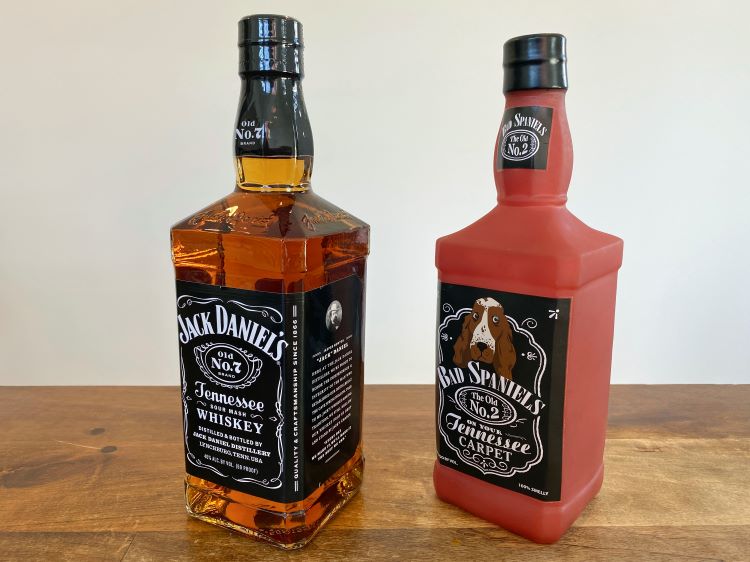Supreme Court gives Jack Daniel’s a chance to prove infringement in 'Bad Spaniels' trademark parody case

A bottle of Jack Daniel's Tennessee whiskey is displayed next to a "Bad Spaniels" dog toy. Photo by Jessica Gresko/The Associated Press.
There is no “special First Amendment protection” for product parodies that use trademarks as their own trademarks, the U.S. Supreme Court ruled Thursday in a case involving Jack Daniel’s and the maker of a parody dog toy.
The Supreme Court unanimously vacated a decision by the 9th U.S. Circuit Court of Appeals at San Francisco that held that the parody dog toy is entitled to protection under the First Amendment as an expressive work with a humorous message.
Jack Daniel’s had asserted that the 9th Circuit decision “unjustifiably transforms humor into a get-of-out-the-Lanham-Act-free card,” referring to the federal law that protects trademarks.
The case was brought by dog toy company VIP Products, which sought a declaratory judgment after Jack Daniel’s demanded that it stop selling its “Bad Spaniels” squeaky dog toy. Jack Daniel’s counterclaimed, alleging that VIP Products infringed and diluted its trademarks.
The Bad Spaniels toy is about the same size and shape as a bottle of Jack Daniel’s. The Jack Daniel’s label says, “Old No. 7 Brand Tennessee Sour Mash Whiskey.” The label on the Bad Spaniels toy replaces that with the phrase: “The Old No. 2 on Your Tennessee Carpet.”
The 9th Circuit had applied a Rogers test, named after a 1989 decision by a federal appeals court in a lawsuit by musical star Ginger Rogers against producers of the movie Ginger and Fred. The Rogers v. Grimaldi decision held that the Lanham Act doesn’t apply to artistic works unless the public interest in avoiding confusion outweighs the public interest in free expression.
The Supreme Court ruled, however, that the Rogers test doesn’t apply when an alleged infringer uses a trademark to designate the source for the infringer’s goods.
“That kind of use falls within the heartland of trademark law and does not receive special First Amendment protection,” the Supreme Court said in its June 8 opinion by Justice Elena Kagan.
The Supreme Court also disagreed with the 9th Circuit’s conclusion that there is no dilution because of the trademark law’s exemption for “noncommercial” use of trademarks. The 9th Circuit had reasoned that the exemption applied because the dog toy communicated a message.
“The use of a mark does not count as noncommercial,” Kagan wrote, “just because it parodies, or otherwise comments on, another’s products.”
Kagan said the noncommercial exclusion doesn’t shield parody when a defendant uses a mark similar to another’s trademark as its own.
On remand, Kagan said, courts below should consider whether the Bad Spaniels toy is likely to cause consumer confusion, a test for infringement.
“But a trademark’s expressive message—particularly a parodic one, as VIP asserts—may properly figure in assessing the likelihood of confusion,” Kagan said.
Kagan stressed that the decision is narrow.
“We do not decide whether the Rogers test is ever appropriate or how far the ‘noncommercial use’ exclusion goes,” she wrote.
Hat tip to SCOTUSblog.
Write a letter to the editor, share a story tip or update, or report an error.



